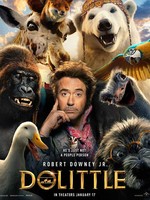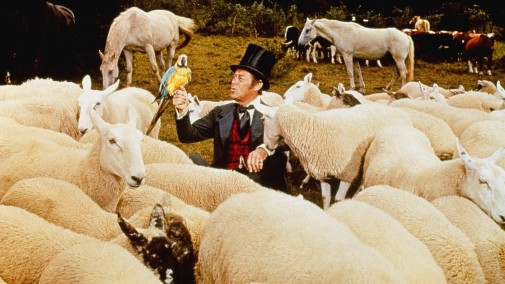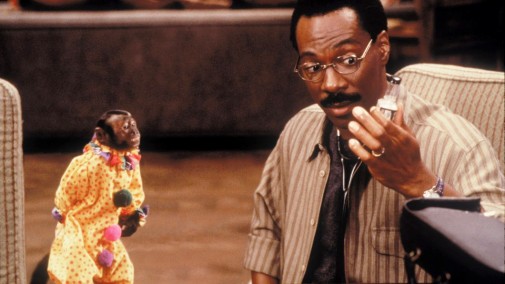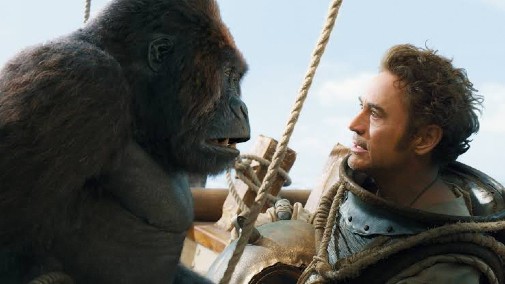 Doctor Dolittle's many literary adventures represent Hugh Lofting's biggest claim to fame. From 1920 to 1952, the English author published around children's books focusing on that eccentric Victorian veterinarian whose studies allowed him to speak to animals. The character is something of an iconic IP, so it's no wonder Hollywood has repeatedly tried to capitalize on its popularity. However, considering all the horrible stories and behind the scenes nightmares associated with these productions, it's a wonder any studio executive even considers putting on another Dolittle extravaganza.
Doctor Dolittle's many literary adventures represent Hugh Lofting's biggest claim to fame. From 1920 to 1952, the English author published around children's books focusing on that eccentric Victorian veterinarian whose studies allowed him to speak to animals. The character is something of an iconic IP, so it's no wonder Hollywood has repeatedly tried to capitalize on its popularity. However, considering all the horrible stories and behind the scenes nightmares associated with these productions, it's a wonder any studio executive even considers putting on another Dolittle extravaganza.
The first of these misbegotten adaptations is a 1967 movie musical that's a good candidate to claim the title of "worst Best Picture Oscar nominee ever"…

Richard Fleischer's Doctor Dolittle is a shitshow of the most monumental variety, both in terms of production and end product. In his book Pictures at a Revolution, Mark Harris explores this in-depth, detailing the hellish spectacle that was the conception and shooting of the thing, which involved a zoo of reluctant animal performers as well as the crumbling model of giant pink snail. There was everything from diarrhea prone wildlife to boozy mayhem and open racism spewing from Rex Harrison's mouth against his fellow actors. It was an insane endeavor, miserable from start to finish and a most spectacular chapter in the annals of cinema's most troublesome shoots.
While the story of its making has a certain entertainment value (schadenfreude is a hell of a drug), the movie itself is deadly dull. Overlong, performed by irritated actors and shot without a single drop of artistic inspiration, this Doctor Dolittle is a crime against cinema and an undue punishment to any viewer unlucky enough to be subjected to its horrors. Of course, if you're an Oscar completist, you'll have to see it in all its unholy glory for it was nominated for nine little golden men, including Best Picture. It won two statues, for its Special Effects and Best Original Song thanks to the tuneless collection of belabored rhymes - Talk to the Animals.
None of this reflects the movie's quality or any kind of box-office success. 1967's Doctor Dolittle was a financial disaster, threatening to bankrupt 20th Century Fox only a few years after The Sound of Music had saved it from the calamity of Cleopatra. It spelled the start of the end for the mega-musical mania of the 60s and left mountains of upon mountains of unwanted merchandise accumulating dust. Why anyone would want to remake this pit of cinematic incompetence is anyone's guess, but, in 1998, the same studio produced a modern retelling starring Eddie Murphy.

Considering the unrelenting misery of the 60s musical, this Betty Thomas directed comedy was a heavenly thing to shoot. Apart from its leading actor being terrified of his animal costars, that is. Some of the panic bleeds into a performance that's always a bit too much, but the actor's innate charisma makes up for it. This was also the first time the audience could understand the animal mutterings, thanks to a new visual effects possibilities and a bunch of voice actors like Albert Brooks as a tiger and Ellen DeGeneres as a dog.
It's no masterpiece, but it's a bearable attempt at mainstream comedy that spurred two sequels and a variety of direct-to-video spin-offs. Jump to 2020 and we have another Dolittle and, this time around, the thing seems more like the '67 disaster than the '98 star vehicle. For one, we're back in Victorian times and with astronomical budgets -- 175 million dollars this time ! Much of the money surely went to the menagerie of digital animals as well as a star-studded cast lead by Marvel veteran Robert Downey Jr. in his first role since leaving Tony Stark behind.

Plagued by endless reshoots, many delays, grim test audience reactions, and an even worse critical reception, Stephen Gaghan's Dolittle will have trouble making its money back despite a decent opening. Descriptions of marble-mouthed Welsh(?) accents and draconian proctology have kept many away from the theaters (including myself), but the sort of reception the movie's getting will probably inspire some kind of cult following. Only a month after Cats rocked our world with its digital fur technology, Universal is performing another strange public act of corporate masochism. What other reason could anyone have to revisit this cursed property?